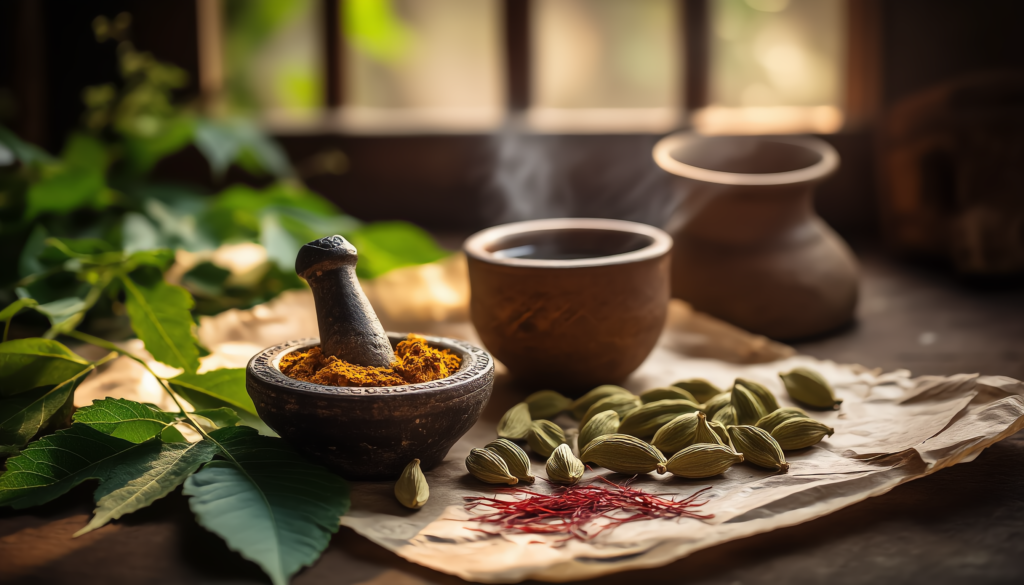If you’ve ever sipped a cup of chai and marveled at its comforting warmth, you’ve likely met cardamom—the “Queen of Spices.” But there’s more to this fragrant pod than just flavor. In Ayurveda, cardamom (also known as elaichi) is a powerhouse remedy for everything from bronchitis and the common cold to fever. Let’s take a deep dive into how this tiny spice, steeped in tradition, is used to soothe, heal, and restore balance in the body.
Cardamom: The Ayurvedic Superstar
Cardamom is a staple in Indian households, not just for its aromatic punch in curries and desserts, but for its deep-rooted place in Ayurvedic medicine. According to Ayurveda, cardamom is a warming spice that balances Kapha—the dosha associated with mucus, cold, and sluggishness—and pacifies Vata, which governs movement and can cause anxiety when out of balance. It’s also celebrated for its detoxifying, anti-inflammatory, and antimicrobial properties, making it a go-to remedy for a range of respiratory and systemic ailments.
How Cardamom Works: The Science Meets Tradition
At the heart of cardamom’s healing power lies its essential oil, particularly a compound called cineole. Cineole is a natural expectorant and anti-inflammatory agent, which helps break down mucus, clear airways, and reduce inflammation in the respiratory tract. This is especially beneficial for conditions like bronchitis, colds, and even fever, where mucus buildup and inflammation are key culprits.
Cardamom is also rich in antioxidants, which combat free radical damage and support the body’s natural detox processes. Its warming effect boosts circulation, stimulates digestion, and helps the body expel toxins—making it a true multitasker in Ayurvedic healing.
Cardamom for Bronchitis: Clearing the Airways
Bronchitis is marked by inflammation of the bronchial tubes, leading to coughing, wheezing, and excess mucus. In Ayurveda, bronchitis is often seen as a Kapha disorder, where mucus accumulation obstructs the respiratory passages.
How Cardamom Helps
- Expectorant Action: Cardamom’s cineole content helps loosen and expel mucus, making it easier to breathe.
- Anti-inflammatory: It soothes inflamed airways, reducing coughing and discomfort.
- Antimicrobial: Cardamom fights off bacteria and viruses that can complicate bronchitis.
- Detoxifying: It helps clear toxins (ama) from the body, supporting overall respiratory health.
Ayurvedic Remedies for Bronchitis
- Cardamom Tea: Brew 1-2 crushed cardamom pods in hot water. Add a dash of ginger for extra anti-inflammatory benefits. Sip slowly to soothe the throat and clear mucus.
- Steam Inhalation: Add a few cardamom pods to boiling water and inhale the steam. This helps open up the airways and relieve congestion.
- Cardamom Powder in Honey: Mix a pinch of cardamom powder with honey and take it as a natural cough syrup.
- Sucking on Cardamom Pods: Chewing or sucking on a cardamom pod can help reduce throat irritation and keep the airways clear.
Cardamom for the Common Cold: Warming and Soothing
The common cold is another Kapha-dominated condition in Ayurveda, characterized by sneezing, runny nose, congestion, and sometimes a mild fever. Cardamom’s warming, expectorant, and anti-inflammatory properties make it an ideal remedy.
How Cardamom Helps
- Decongestant: Cardamom clears nasal and chest congestion, making it easier to breathe.
- Anti-inflammatory: It soothes irritated throat and nasal passages.
- Immune Support: Its antioxidants and antimicrobial properties help the body fight off infections.
- Detoxifying: Cardamom helps the body eliminate toxins that can prolong illness.
Ayurvedic Remedies for the Common Cold
- Cardamom Infused Water: Boil a few cardamom pods in water and drink it warm. This helps clear mucus and soothe the throat.
- Cardamom and Ginger Tea: Combine cardamom with fresh ginger for a potent immune-boosting tea.
- Steam Inhalation: Inhale steam from cardamom-infused water to relieve nasal congestion.
- Cardamom Powder in Honey: Take a pinch of cardamom powder mixed with honey to ease cough and sore throat.
Cardamom for Fever: Detox and Recovery
In Ayurveda, fever is often seen as a sign of accumulated toxins (ama) in the body, which disrupts the flow of energy and weakens immunity. Cardamom’s warming, detoxifying, and antimicrobial properties make it a valuable ally in managing fever and supporting recovery.
How Cardamom Helps
- Detoxifying: Cardamom helps flush out toxins through its diuretic and warming effects, supporting the body’s natural detox processes.
- Diaphoretic: It promotes sweating, which helps break a fever and expel toxins.
- Digestive Support: Fever often weakens digestion. Cardamom stimulates digestive enzymes and eases bloating, helping the body absorb nutrients and recover faster.
- Immune Boost: Its antioxidants and antimicrobial compounds help the body fight off infections.
Ayurvedic Remedies for Fever
- Spicy Cardamom Tea: Brew cardamom with ginger, cinnamon, and a pinch of black pepper to induce sweating and break a fever.
- Cardamom Infused Water: Drink warm cardamom water to support detox and hydration.
- Post-Fever Light Diet: After the fever breaks, continue to drink cardamom-infused water or tea to support digestion and prevent relapse.
- Chewing Cardamom: Chewing a cardamom pod can help relieve nausea and support recovery.
Cardamom in Ayurvedic Texts: Ancient Wisdom, Modern Relevance
Cardamom’s medicinal uses are well-documented in classic Ayurvedic texts like the Charak Samhita and Dravyaguna Vijnana. It is classified under shwashara mahakashaya—a group of herbs that relieve respiratory problems—and angamarda prashamana mahakashaya, which are herbs that relieve body aches. Cardamom is also recognized for its ability to freshen breath, relieve bloating, and act as a cardiac tonic.
How to Use Cardamom at Home: Simple Ayurvedic Recipes
Here are a few easy ways to incorporate cardamom into your wellness routine:
- Cardamom Tea: Crush 1-2 cardamom pods and add to your favorite tea. Brew with ginger for extra warmth and anti-inflammatory benefits.
- Cardamom Water: Boil a few cardamom pods in water and drink it warm. This is especially soothing for colds and sore throats.
- Steam Inhalation: Add cardamom pods to boiling water and inhale the steam to clear congestion.
- Cardamom Powder in Honey: Mix a pinch of cardamom powder with honey and take it as a natural cough syrup.
- Chewing Cardamom Pods: Suck on a cardamom pod to freshen breath and soothe the throat.
The Science Behind Cardamom’s Healing Powers
Modern research supports many of Ayurveda’s traditional uses for cardamom. Studies have shown that cineole, the active compound in cardamom, has expectorant, anti-inflammatory, and antimicrobial properties, making it effective for respiratory conditions like bronchitis and the common cold. Cardamom’s antioxidant content helps protect cells from damage and supports the immune system.
Its warming and detoxifying effects are also backed by science. Cardamom stimulates digestion, promotes sweating, and helps the body eliminate toxins—key factors in managing fever and supporting recovery.
Cardamom: More Than Just a Spice
Beyond its medicinal uses, cardamom is a versatile ingredient that can be added to a wide range of dishes and beverages. From curries and desserts to coffee and chai, cardamom enhances flavor while delivering health benefits. Its ability to balance acidity makes it a popular addition to coffee in the Middle East, where it is often brewed with cardamom powder to offset the acidic effects of coffee.
Precautions and Side Effects
While cardamom is generally safe for most people, it’s important to use it in moderation. Excessive consumption may cause digestive discomfort in some individuals. If you have a medical condition or are taking medication, consult your healthcare provider before using cardamom as a remedy.
Conclusion: Cardamom—A Timeless Remedy for Modern Times
Cardamom’s role in Ayurveda is as rich and complex as its flavor. From clearing mucus in bronchitis and soothing the common cold to supporting detox and recovery during fever, this humble spice is a true multitasker. Its blend of ancient wisdom and modern science makes it a valuable addition to any wellness toolkit.
So next time you reach for a cup of chai or a pinch of spice, remember: cardamom isn’t just for flavor—it’s for healing, too.
Ready to spice up your health routine? Give cardamom a try—your lungs, throat, and immune system will thank you!
Disclaimer: This article was written for informational purposes only, Always consult a doctor for diagnosed conditions.








